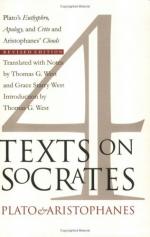
|
| Name: _________________________ | Period: ___________________ |
This test consists of 15 multiple choice questions and 5 short answer questions.
Multiple Choice Questions
1. According to Socrates, what is dangerous about the conclusion that human good is related to what is dear to the gods?
(a) The gods are unknowable, making this conclusion merely speculative.
(b) Human good is only separated from human evil by a hair.
(c) Any conclusion about human good should include societal values.
(d) The gods may hate humans, making this conclusion suspect.
2. How should one seeking meaning in life, according to Socrates?
(a) By considering a set of ideals, which one can use to compare to one's own life.
(b) By dulling one's senses with drugs and alcohol.
(c) By asking good friends for advice.
(d) By obeying the will of the gods.
3. Why does Socrates object to the notion that piety is a system of exchange between gods and men?
(a) There is no delivery system in place for the exchange.
(b) The "currency" between gods and men does not translate well.
(c) Men can never offer the one thing the gods truly crave: mortality.
(d) Gods could not possibly need anything from humans.
4. According to Euthyphro, what might Socrates say about his own level of knowledge?
(a) Socrates feels wisdom is completely unimportant.
(b) Socrates feels he is a storehouse of knowledge.
(c) Socrates feels he knows nothing.
(d) Socrates feels he has a great memory.
5. In Euthyphro, what problem does Socrates have with the suggestion that it is good to be dear to the gods?
(a) The gods are, most likely, ordinary humans.
(b) The gods behave arbitrarily, and not according to an objective standard.
(c) The gods all behave according to a rigidly objective standard.
(d) The gods do not appear on earth to perceive human behavior.
6. According to Socrates, why would political life be dangerous for him?
(a) He would become too absorbed by the affection and attention.
(b) He would try to help everyone, and despair when he could not.
(c) Those who fight for justice are killed.
(d) He is too tempted by power.
7. Why does Socrates say that he is not impious?
(a) He in fact believes in Zeus wholeheartedly.
(b) He regularly speaks with the voice in his head.
(c) Meletus, in charging impiety, has contradicted himself.
(d) He believes there are cloud goddesses.
8. Who does Euthyphro compare to himself and his father?
(a) Zeus and Hera.
(b) Plato and Socrates.
(c) Zeus and Kronos.
(d) Zeus and Hercules.
9. According to Socrates, the philosopher who tells the truth ... ?
(a) Will be loved.
(b) Does not exist.
(c) Will be hated.
(d) Will be feared.
10. While arguing about his way of life, how does Socrates position himself with respect to Athens?
(a) The needed villain of Athens.
(b) The plumber of Athens.
(c) The savior of Athens.
(d) The artist of Athens.
11. What is prophecy?
(a) Faith in the gods.
(b) Hatred for one's own family.
(c) A ritual rite of passage to manhood.
(d) Knowledge of the future.
12. The Euthyphro is known as what kind of writing?
(a) Play.
(b) Dialogue.
(c) Autobiography.
(d) Novel.
13. What is the "good life" as defined by Athens law, according to Plato's Apology?
(a) Actively seeking meaning in one's life.
(b) Obeying rules created by gods.
(c) Constant accumulation of knowledge.
(d) Eating, drinking, and being merry.
14. Which is the first of three Socratic dialogues written by Plato?
(a) Crito.
(b) Euthyphro.
(c) Apology.
(d) The Clouds.
15. At the end of Apology, what is Socrates' opinion on death?
(a) Death is an illusion of the mind.
(b) Death is frightening.
(c) Death is not harmful.
(d) Death is full of suffering.
Short Answer Questions
1. What is Euthyphro's profession?
2. What sentence does Socrates' friends beg for him to choose?
3. According to Socrates, what gives him the right to challenge society, in Apology?
4. What attitude has Meletus adopted about the trial of Socrates?
5. Why is Socrates heartened about the possibility of an afterlife?
|
This section contains 695 words (approx. 3 pages at 300 words per page) |

|




